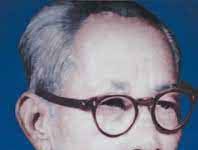Sardar Vallabhbhai Patel-Brief Biography
Sardar Vallabhbhai Patel-Brief Biography
Sardar Vallabhbhai Patel-Brief Biography
Sardar Vallabhbhai Patel (popularly known as the ‘Iron Man of India‘) was a lawyer, Freedom Fighter, skilled politician, social reformer, and the first Deputy Prime Minister of independent India.
Vallabhbhai Patel was born on October 31, 1875, in Nadiad, Gujarat (his birth anniversary is now celebrated as ‘Rashtriya Ekta Divas or ‘National Unity Day‘).
He belonged to a middle-class farmer family. In his early years, Patel was regarded by many as a man destined for a normal job. However, he passed law exams, often studying on his own with borrowed books.
In 1891 he married Jhaverben Patel who bore him two children Miraben Patel and Dahyabhai Patel. But after living a conjugal life of eleven years his wife Jhavarben Patel died.
After passing the bar exam, Patel practiced law in Godhra, Borsad and Anand in Gujarat. He earned the reputation of being a fierce and efficient lawyer.
Sardar Vallabhbhai Patel had a dream to study law in England. Using his hard-earned money, he was able to get a pass and ticket to go to England. In 1911, at the age of 36, two years after the death of his wife, Vallabhbhai Patel traveled to England and enrolled at the Middle Temple Inn in London. Patel stood at the top of his class despite having no previous college background. He completed the 36-month course in 30 months.
Returning to India, Sardar Patel settled in Ahmedabad and became one of the city’s most successful barristers.
In 1917 he met Mahatma Gandhi and joined the Congress and became the secretary of the Gujarat Sabha which later became a Congress stronghold. At Gandhi’s call, Patel joined the movement to fight for the exemption of taxes in Kheda during the plague and famine (1918).
Patel joined Gandhi’s non-cooperation movement (1920) and traveled to western India to recruit 300,000 members. He also collected over Rs 1.5 million for the party fund.
There was a British law banning the hoisting of the Indian flag. When Mahatma Gandhi was imprisoned, it was Patel who led the Satyagraha movement in Nagpur in 1923 against British law.
It was the Bardoli Satyagraha of 1928 that gave Vallabhbhai Patel the title of ‘Sardar’ and made him popular throughout the country. Such was the influence that Pandit Motilal Nehru suggested the name of Vallabhbhai to Gandhiji for the post of Congress President.
In 1930, during the Salt Satyagraha, the British arrested Sardar Patel and tried him without witnesses.
During the Quit India Movement (1942), Patel was arrested by the British. From 1942 to 1945, he was imprisoned in Ahmednagar Fort along with the entire Congress Working Committee.
After signing the Gandhi-Irwin Pact, Patel was elected the President of the Congress for the 1931 session (Karachi).
Patel used his position as Congress president to organize the return of confiscated land to farmers in Gujarat.
Patel worked extensively against alcohol consumption, untouchability and caste discrimination and for the emancipation of women in Gujarat and outside.
After a hard struggle, India achieved freedom in 1947 and Sardar Patel became the Deputy Prime Minister of free India. Later he became the Home Minister of India under the Prime Ministership of Pandit Jawaharlal Nehru.
As India’s first Home Minister and Deputy Prime Minister, Patel organized relief efforts for refugees fleeing Punjab and Delhi and worked to restore peace.
To become Sardar Patel’s most enduring legacy, he took charge of the State Department and was responsible for the integration of 565 princely states into the Union of India. Paying tribute to him, Nehru called Sardar the ‘builder and consolidator of New India’.
Sardar Patel despite his failing health and age never lost sight of the larger purpose of creating a United India. As India’s first Home Minister and Deputy Prime Minister, Sardar Patel played a key role in the integration of about 565 princely states into the Indian Union.
Few princely states like Travancore, Hyderabad, Junagadh, Bhopal and Kashmir were averse to joining the state of India.
Sardar Patel worked tirelessly to build a consensus with the princely states but did not hesitate in employing methods of Sama, Dama, Dand and Bhed where ever necessary.
He had used force to annex the princely states of Junagadh ruled by Nawab and Hyderabad ruled by Nizam, both of whom had wished not to merge their respective states with the Union of India.
Sardar Vallabhbhai Patel stitched the princely states along with British Indian territory and prevented the balkanization of India.
Sardar Patel was of the opinion that we will not have a united India if we do not have a good all-India Service.
Sardar Vallabhbhai Patel was clearly conscious of the fact that independent India needed a steel frame to run its civil, military, and administrative bureaucracy. His faith in institutional mechanisms like having an organized command-based army and a systemized bureaucracy proved to be a blessing.’
His exhortation to the probationers to maintain utmost impartiality and incorruptibility of administration is as relevant today as it was then.
However, Sardar Patel’s invaluable services were available for independent India only for 3 years. The brave son of India died on 15 December 1950 (age 75 years) after suffering a massive heart attack. 0 0 0.
Sardar Vallabhbhai Patel
Read More: Tips for Writing Essay
Sardar Vallabhbhai Patel
N. B. The article ‘Truthfulness-An Essay’ originally belongs to the book ‘School Essays Part-I‘ by Menonim Menonimus.
Sardar Vallabhbhai Patel
Books of Composition by M. Menonimus:
- Advertisement Writing
- Amplification Writing
- Note Making
- Paragraph Writing
- Notice Writing
- Passage Comprehension
- The Art of Poster Writing
- The Art of Letter Writing
- Report Writing
- Story Writing
- Substance Writing
- School Essays Part-I
- School Essays Part-II
- School English Grammar Part-I
- School English Grammar Part-II..











